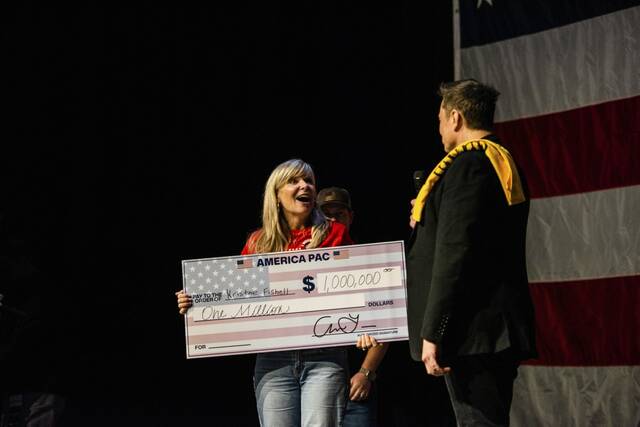https://development.triblive.com/opinion/lori-falce-lessons-for-elon-musk-from-the-publishers-clearing-house-sweepstakes/
Lori Falce: Lessons for Elon Musk from the Publishers Clearing House Sweepstakes

When I was a kid, I loved seeing the Publishers Clearing House envelope show up in the mailbox.
I would open it and spread out the contents on the dining room table — stickers in this pile, cards in another, forms in a third. I would read the rules like I was studying for the bar exam. I knew everything that had to be filled out, how to fill it out and what stamps needed to be attached.
If you think the signing and dating of the various envelopes for a mail-in ballot in Pennsylvania is complicated, you clearly never entered the Publishers Clearing House Sweepstakes.
This is where I admit that part of the complexity was not exactly in the contest itself. It was my over-analytical interpretation of the rules — and my childlike ability to be swayed by marketing. Full disclosure: I have not outgrown that gullibility. I am the reason there are impulse items at checkout counters.
The rules said you did not have to buy any of the magazines or other items to win, but I didn’t believe that. There were all of these things for sale. It didn’t make sense that buying a subscription or an “as seen on TV” gadget wouldn’t give you an edge.
The purpose of marketing contests is to drive participation. Maybe it’s a chance to win a free burger or a new car by peeling off a sticker on a fast-food wrapper. I’ve been in the Pillsbury Bake-Off twice. Both times required me to use Pillsbury and other sponsor products in the recipes I created; I doubt they wanted me to steal pie dough.
And this is why people are understandably skeptical of Elon Musk’s pledge to hand out daily giant checks from his America PAC to a lucky swing-state registered voter in return for signing the “Petition in Favor of Free Speech and the Right to Bear Arms.” There’s also a smaller check — $100 — for those who sign the petition and another for those who refer a signer.
Musk’s camp argues it’s perfectly legal and not a lottery encouraging people to vote for a particular candidate. Others are alarmed at the implications. Pennsylvania Gov. Josh Shapiro believes law enforcement needs to investigate the legality. The Justice Department has warned it could violate election law; it is illegal to pay people to vote or register.
So far, two Southwestern Pennsylvanians have received the $1 million prize.
Mail-in balloting is underway in Pennsylvania. It is possible those participating in the petition already have cast a ballot. The question is if they believed they must vote for Musk’s preferred candidate, GOP nominee and former president Donald Trump or felt free to vote for Vice President Kamala Harris or a third-party candidate.
On Wednesday, the PAC didn’t award a prize after the Justice Department warning. That creates another issue. People signed the petition based on terms no longer fulfilled because it appears no one made sure the giveaway was legal before it began.
Perhaps Musk and his PAC should have asked Publishers Clearing House for guidance.
In 2023, the company agreed to $18.5 million in refunds to customers as part of a settlement with the Federal Trade Commission. The issue was that the marketing “tricked consumers, including many older adults, into believing they had to buy things” to enter or increase their odds of winning.
Maybe someone should have spread everything out on the dining room table to take a good look at it first.
Copyright ©2025— Trib Total Media, LLC (TribLIVE.com)
